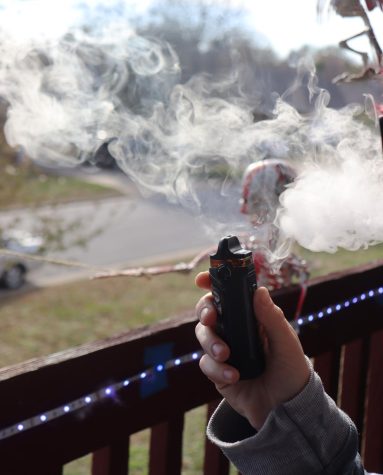Between the Smoke
December 7, 2022
Students have brought them into bathrooms to congregate and share with their friends during class or a passing period. Addiction to nicotine can give users the peace and calm their body needs; for others, it can cause a world of mental decline. Madison Whittemore, 2020 Nixa graduate, understands how vaping can affect you as a teenager because she did it.
“[When I was in high school] I vaped in the bathroom with my friends because it was secluded,” Whittemore said. “I think that’s why teens still do it, just in a more obvious way.”
While Whittemore got into trouble for vaping at school, her punishments were less severe than what they are now.
“When I first got caught, they took away my vape and gave me one day of [after school detention],” Whittemore said. “As I got caught more, I got more days of ASD – that got moved into days of ISS.”
The punishment for vaping now at the highschool starts with three days of in-school suspension. One the second offense, the punishment moves to three days of out-of-school suspension. Assistant principal Jeremy McCoy said the trend of harsher punishments for vaping is supported by district leaders.
“Since the amount of kids who get in trouble for vaping has increased, the school board has ramped up the amount of time students spend in ISS or OSS,” McCoy said. “We are in the process of building a class for those students so they can better understand why vaping is bad and why they are getting in trouble for it.”
McCoy says studies have shown how vaping can affect teens’ physical and mental health.
“Tons of studies have shown the effect vaping has on your lungs and your growth,” McCoy said. “If you are addicted to something. It is constantly something you are thinking about and always on your mind. If I am sitting in class and I feel the urge to vape. It’s going to be the only thing on my mind until I finally feed that craving.”
School nurse Melinda Lansdown has spent time researching addiction and the effect it has on teenagers.
“It all starts when you finally become addicted to it,” Lansdown said. “When you have an addiction, it becomes hard to concentrate and when you can’t concentrate it can create some bigger issues in your mental health like anxiety or depression.”
Lansdown agrees the appealing taste of a vape only makes it more risky.
“Vaping can attract people with the flavors,” Lansdown said. “It is convenient to get and they are cheaper and last longer than cigarettes.”
Whittemore knew she was addicted.
“Vaping is able to calm my nerves in the most exhausting situations,” Whittemore said. “I enjoy vaping because of how good it tastes. I can find tons of flavors at the place I shop.”
McCoy understands why stressed teenagers might sometimes turn to nicotine.
“High school is hard and high school is stressful,” McCoy said. “One of the myths is that tobacco calms you down. It does the opposite, it makes you more anxious and just constantly aggravates you.”
Lansdown’s student nurse from Missouri State University, Carolyn Feldt, learned that vaping can also cause stress that can affect teens in their home lives.
“I think if the kid’s parents don’t want them to vape, then the kid is going to hide it and become more careful to make sure they don’t do it in front of them,” Feldt said. “They get stressed out hiding it around those people.”
Whittemore said she understands that fighting addiction isn’t easy. She got introduced to vapes at the start of high school after her dad got her a zero nicotine vape. Shortly after that, she moved to cigarettes and started working a job and moved out.
In December of 2019, the United States changed the legal age of buying tobacco products from 18 to 21. Whittemore was only able to legally purchase nicotine products for a few months and was angry about the change in the law.
“Even though I was able to get them from anyone when I was underaged,” Whittemore said. “I felt responsible when I was able to buy that stuff.”
Whittemore was able to find people to buy supplies for her even after she moved out.
“I was able to find people I knew that would buy cigarettes in bulk and vape juice to keep me company for a little while,” Whittemore said.
Lansdown said second-hand vape exposure is almost equally as bad as first-hand vaping.
“Even if you’re not the one vaping, but you have friends and family who do, you can still inhale that and it is called second-hand vaping,” Lansdown said. “Vaping in public is a bad thing because you can be second-hand smoking. Asthma, seasonal allergies, are going to be more sensitive to the vapor.”
The damage vaping can cause on your physical and mental health is irreversible and Lansdown suggests if you want to quit, to talk to her.
“[Students] can come to the nurses office and we can help them try to quit. Very few kids will admit to vaping and ask for help,” Lansdown said. “If you are scared to ask for help, try chewing gum to keep your mind off nicotine.”






